

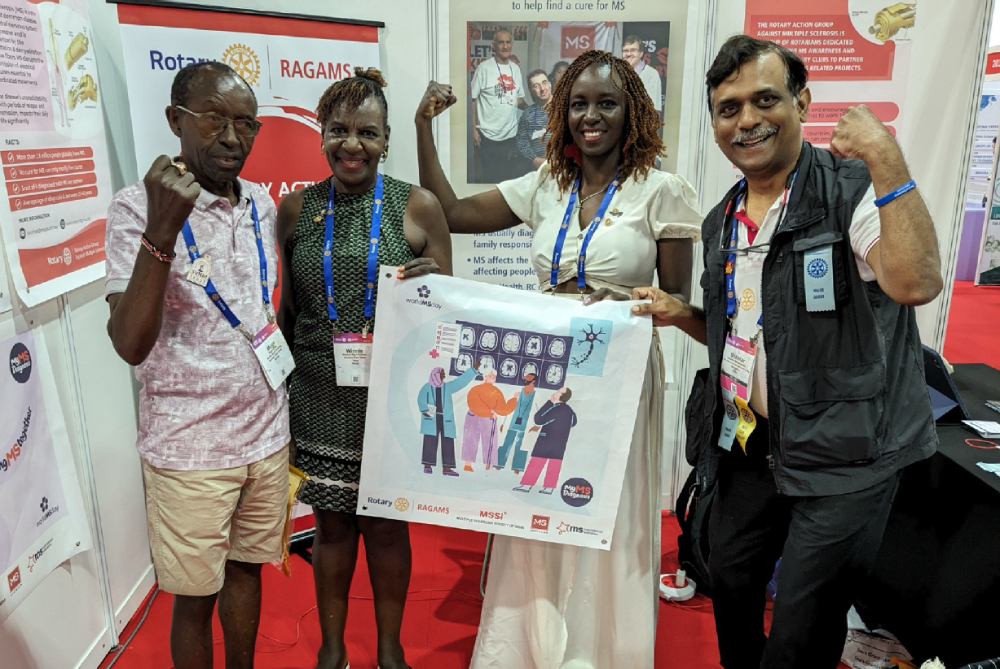
Bringing the world together to improve the quality of life of those affected by MS and to end MS forever
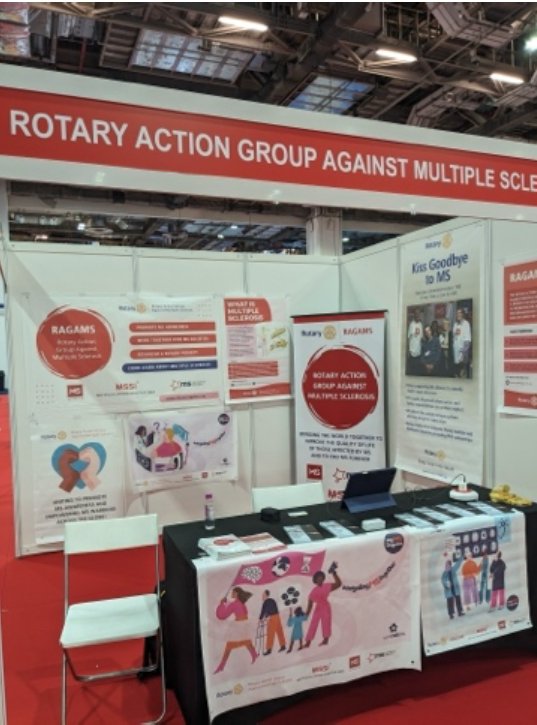
The following is the project summary of the PhD, started in February 2024:
Biomarkers of Personalized Therapy for Multiple Sclerosis Investigating at Melbourne University
Multiple sclerosis (MS) is the second most common cause of disability in young adults, and is associated with significant societal costs. It is a challenging autoimmune condition characterized by episodic inflammation that may lead to secondary neurodegeneration in the central nervous system (CNS). Twenty therapies are presently available for treatment of this inflammation, but individual response to each of these therapies is highly variable. Timely initiation of the right disease-modifying therapy (DMT) is the cornerstone of successful therapeutic management as it plays a critical role in preventing further worsening of disability.
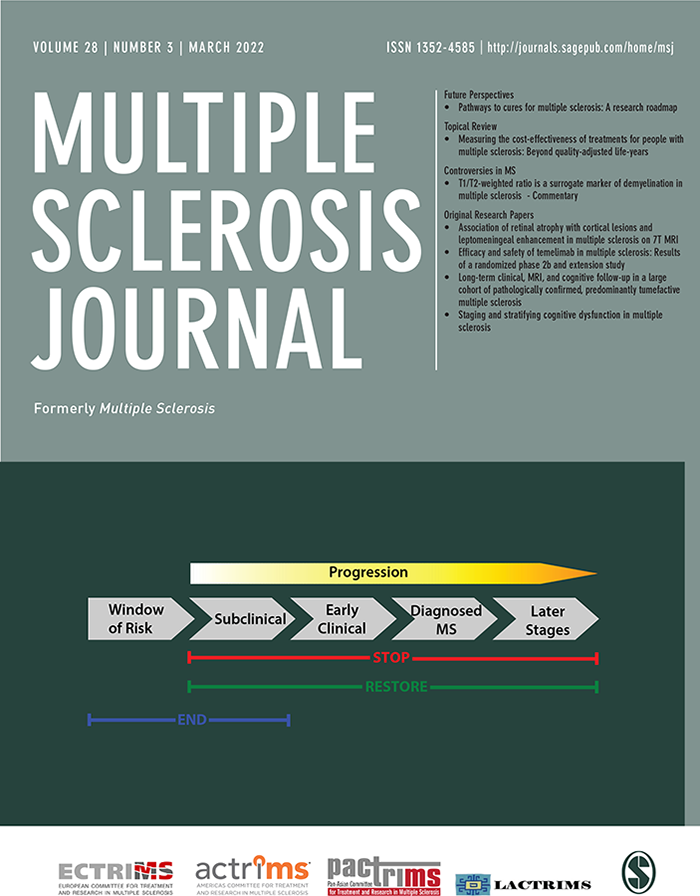
Despite recent advances in MS pharmacotherapy, disability prevention in patients has remained challenging and often suboptimal. This gap between the capabilities of the presently available therapies and the attimes suboptimal individual response to therapy is often attributed to the lack of understanding of factors that predispose individuals with MS to be good or suboptimal responders to concrete DMTs. Recent research has highlighted the potential of predictive algorithms that integrate clinical and biological data to guide treatment decisions in MS.
This doctoral research endeavours to propel the field forward by developing an enhanced predictive algorithm - "Crystal Ball 2.0." This innovative algorithm integrates builds on its first version, which demonstrated that individual response to the commonly used DMTs can be predicted, albeit to a limited extent, based on patients’ clinical and demographic characteristics. During this PhD, I will further develop this predictive algorithm by incorporating novel biomarkers, aiming to augment the precision of predicting individual responses to DMTs. The study is a collaborative, multi-site effort spanning Australia, Sweden, Switzerland, and the Czech Republic. Leveraging diverse cohorts and advanced statistical techniques, the project will refine the first version of the Crystal Ball predictive model of individual treatment response by:
The overarching objective is to facilitate more accurate and effective personalized therapy for individuals with MS. The project seeks to mitigate worsening of disability and thus elevate the overall quality of life among people living with MS through precision-led choice of MS therapy.
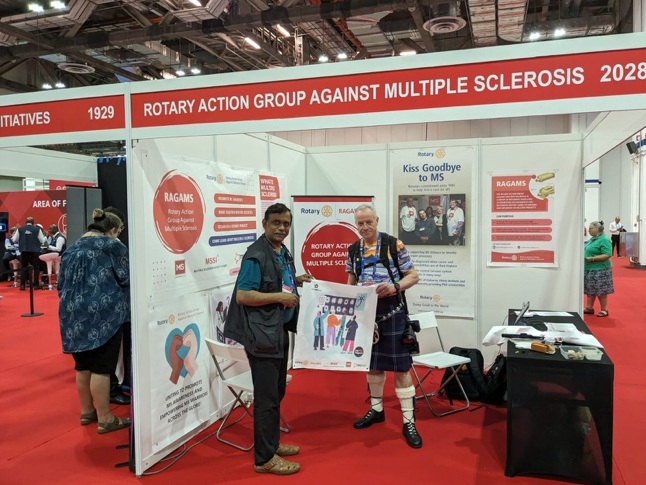
The recently concluded Rotary International Convention in Singapore provided an invaluable platform for the Rotary Action Group against Multiple Sclerosis (RAGAMS) to raise awareness and drive action towards combating Multiple Sclerosis (MS). As a representative of RAGAMS, I had the privilege of engaging with Rotarians from diverse regions, discussing the critical issues surrounding MS, and highlighting the need for increased involvement in this cause.
During the convention, it became evident that awareness about RAGAMS is relatively low among Rotarians. Many attendees were surprised to learn about the existence of an exclusive action group dedicated to MS. This gap in awareness underscores the necessity for more robust communication and outreach efforts to ensure that Rotarians worldwide are informed about RAGAMS and its mission.
Engaging with Rotarians from different parts of the world revealed a universal recognition of the importance of addressing MS.
However, the level of active participation and support varies significantly across regions.
The convention highlighted the need for a more coordinated global effort to:
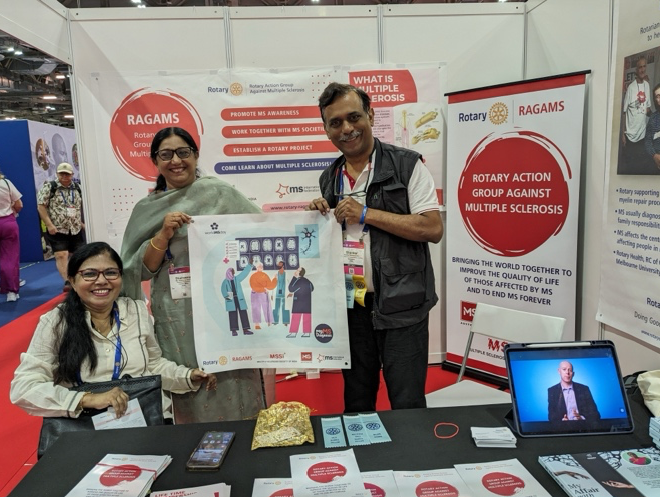
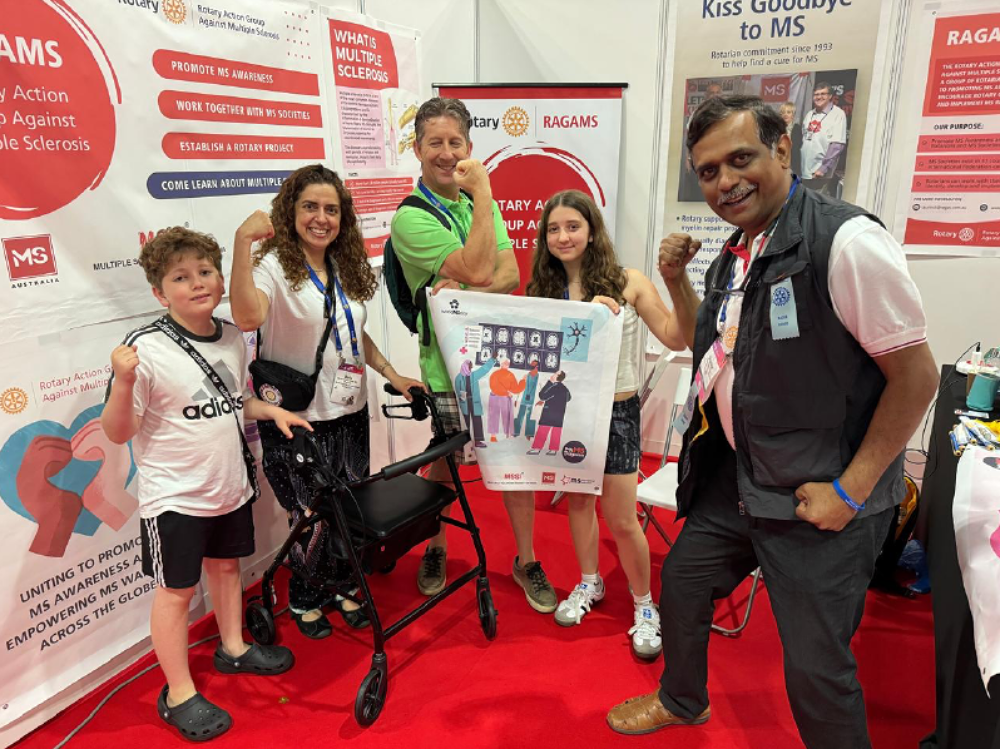
The Rotary International Convention in Singapore was a significant opportunity for RAGAMS to enhance its visibility and forge new partnerships. The interactions with Rotarians underscored the urgent need for a more inclusive and coordinated approach to tackling MS.
Moving forward, it is imperative to expand our outreach efforts, support research endeavours, and drive community support initiatives. By doing so, RAGAMS can make a meaningful impact in the fight against Multiple Sclerosis and improve the lives of those affected by this debilitating condition.
I urge all Rotarians to get involved with RAGAMS, spread the word within their communities, and contribute to our collective efforts in combating MS. Together, we can make a difference and move closer to a world free from the challenges posed by Multiple Sclerosis.
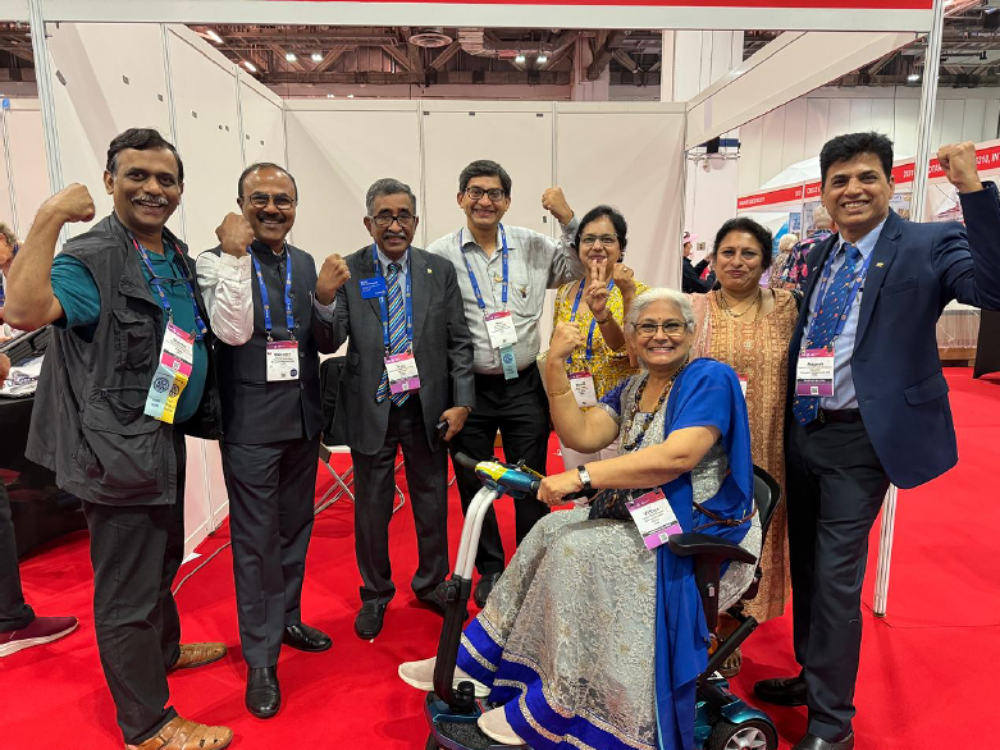
Prepared by: Martin, Diana and Shankar
“Rotarians can make a difference”
Diana and Martin were invited to attend the launch of the new Royal Melbourne Hospital Neuroimmunology Centre at 635 Elizabeth St Melbourne on November 2nd ,2023. This unique centre, based at a tertiary Victorian public hospital, collocates and integrates specialist care in multiple sclerosis and other neuroimmunological diseases with clinical and laboratory research, trials and education.
Guest speakers included international guest, Professor Sandra Vukusic, academic neurologist from France, Board Member of the ECTRIMS and director of the French National MS Registry, who presented the keynote lecture of the evening describing the collaboration between prominent academic centres nationally, internationally and the use of MS Registries.
It was a very interesting visit including tour of the new building, for more information please click on following link: https://core.melbourne/
India- The following event was a success and objectives were met
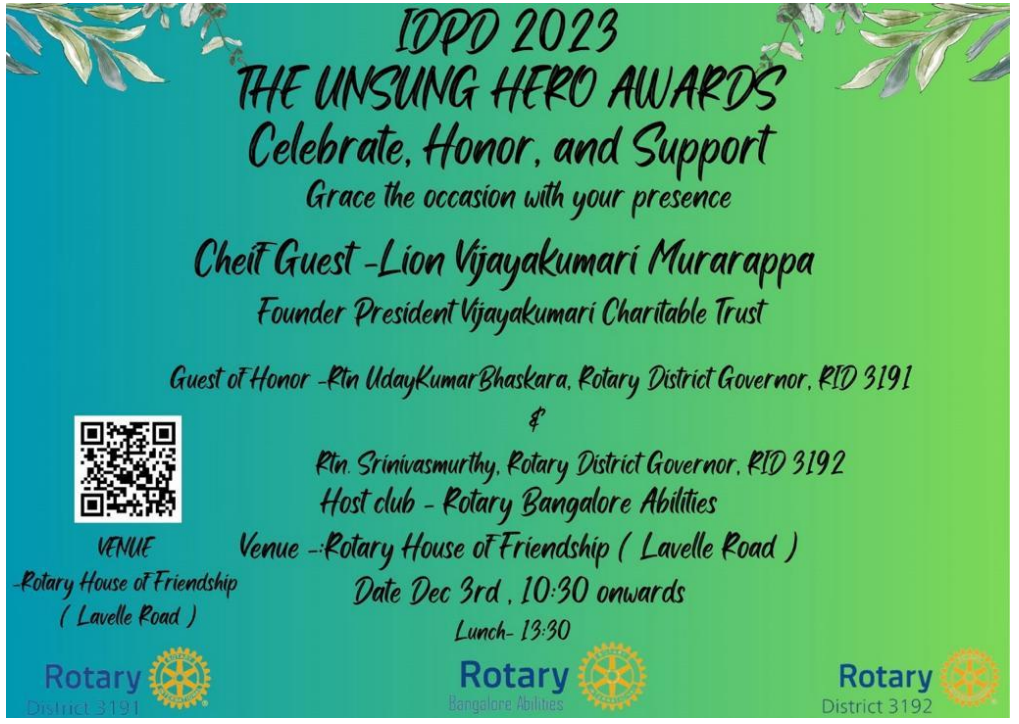
The European and American Committees for Treatment and Research in MS (ECTRIMS/ACTRIMS) recently held their joint meeting in Milan, Italy, from 11-13 October 2023.
This meeting is seen as the pinnacle of scientific and medical research into MS, bringing together researchers and health professionals from all around the world to share and hear the latest updates and research findings on the treatment, care and management of MS.
Our team at MS Australia had the privilege of attending this conference to bring the highlights to the Australian community. The knowledge and the collaborations developed will inform our work to keep pushing forward towards the prevention, better treatments and a cure of MS.
Selecting features is never easy, with many sessions running concurrently, but this article provides an overview of some of the key highlights, which we have detailed under MS Australia research priorities of causes and prevention, better treatments and a cure.
Dr Stephen Hauser (University of California, San Francisco) gave the opening lecture, describing advances that have been made in MS research to get us closer to cures.
He stated that the powerful disease modifying therapies (DMTs) that stop nearly all relapses have made researchers more aware that there can be silent progression underlying MS in the absence of relapses.
Dr Hauser argued that current medications can partially suppress MS pathology, but the next phase of research and treatment should concentrate on complete suppression and a cure.
This could be achieved by focusing on understanding the initial stages of MS, where benign autoimmunity is present, but MS pathology is yet to begin.
Vitamin D and MS onset: Vitamin D is associated with a reduced risk of MS onset, but it’s unclear whether it’s the vitamin itself or sunlight exposure that increases levels of vitamin D. Akash Kapali from the University of Bergen in Norway and colleagues looked at vitamin D intake in more than 70,000 women enrolled in the Norwegian Mother and Child Cohort Study, and identified those who developed MS through the country’s MS registry.
Norway has insufficient sun-induced vitamin D production during most of the year. Higher intake of total dietary vitamin D was linked to a 37% lower risk of developing MS, supporting the idea that vitamin D itself is the source of this association.
EBV and the immune system: Dr Thomas Berger from the Medical University of Vienna in Austria presented results of a study that compared the immune systems of people with high levels of Epstein-Barr virus (EBV)-targeted antibodies in their blood, some of whom have MS and some of whom do not.
Dr Berger found that the people living without MS tended to have higher levels of immune natural killer cells capable of eliminating autoimmune reactions such as what is thought to be triggered by EBV. Having specific MS-linked immune genes that inhibit natural killer cells substantially increased the risk of MS.
EBV and AHSCT: In the EBV and clinical trials session, Dr Jennifer Massey from St Vincent’s Hospital NSW presented her work on the reconstitution of the immune system following autologous haematopoietic stem cell transplant (AHSCT). This study revealed that EBVinfected T cells are enriched in people following transplantation.
Health behaviours and modifiable lifestyle choices: Australians also presented in the poster sessions on the role of lifestyle factors in the management of MS. Associate Professor Yasmine Probst from the University of Wollongong NSW and her team presented on the key considerations for this type of research and ensuring that research outcomes are robust and able to be implemented within the MS community.
Wearable technologies: There is growing attention to finding ways to better track how people are doing day-to-day, in between infrequent clinic visits. Associate Professor Anneke van der Walt from Monash University VIC provided an overview of wearable and digital technologies, and the opportunities and issues they present.
Treatments in clinical practice: Professor Tomas Kalincik from the University of Melbourne VIC took part in a session on the treatment of MS and the value of different approaches in clinical practice.
This session covered topics such as treatment decisions at different life stages and ages and the role of treatment changes and escalation in light of real-world evidence.
VISIONARY-MS trial: The early results of a phase 2 clinical trial to assess the safety and effectiveness of CNM-Au8, a gold nanocrystal suspension, in relapsing MS, were presented by Dr Heidi Beadnall from the Brain and Mind Centre NSW.
The results show a promising outcome for the gold nanocrystal suspension to promote protection and repair of the brain and spinal cord by boosting cellular energy metabolism.
Imaging to detect repair: A persistent challenge with studies aiming to protect the brain and spinal cord and promote regeneration is how to quickly detect whether repair has been successful. Several presentations showed progress toward this goal using advanced MRI, optical coherence tomography (OCT) and positron emission tomography (PET).
Myelin repair by metformin: Dr Anna-Victoria De Keersmaecker, Dr Barbara Willekens and their team from the University of Antwerp, Belgium, are testing the ability of the diabetes treatment metformin to protect the brain and promote myelin repair in people with progressive MS.
They presented their study design and plan to enrol 120 participants across Belgium. They will be looking for improvements or stabilisation of walking speed, cognition (thinking and memory) and other measures of disability, as well as MRI-detected brain volume.
The newly formed Global MS Research Strategy Group, representing major MS organisations around the world, including MS Australia, commissioned a study to better understand the landscape of MS research by not-for-profit and government organisations worldwide.
The results were presented at ECTRIMS, showing that at least 1,305 research projects have been funded by 16 not-for-profit organisations, including MS Australia, during 2021-2023. These projects are valued at over €379 million ($390 million AUD) and represent all three Pathways to Cures categories:
Stop: MS in its tracks by ending disease activity and preventing further progression for those who already have MS.
Restore: Restore what has been lost by repairing the nervous system and boosting rehabilitative approaches to restore function.
End: End the disease forever by finding the cause of MS, understanding what triggers it, and protecting against it.
This analysis highlights potential areas for an enhanced research effort and multidisciplinary collaboration.
Global cooperation and alignment of resources will accelerate progress towards knowledge, treatments, and cures for MS.
MS organisations, including MS Australia, have jointly declared their collective commitment to a global research strategy to accelerate cures for MS.
It was a jam-packed conference with lots of progress in identifying the causes of MS, detecting progression, and finding ways to protect and repair the brain and spinal cord.
In the words of Dr Stephen Hauser, “MS is one of the two or three great success stories of modern molecular medicine. We are halfway home…”.
It has been a great privilege to be able to attend this conference and bring the highlights to the Australian community.
The knowledge and the collaborations developed will inform our own work at MS Australia, to keep pushing forward towards the pathway to cures.

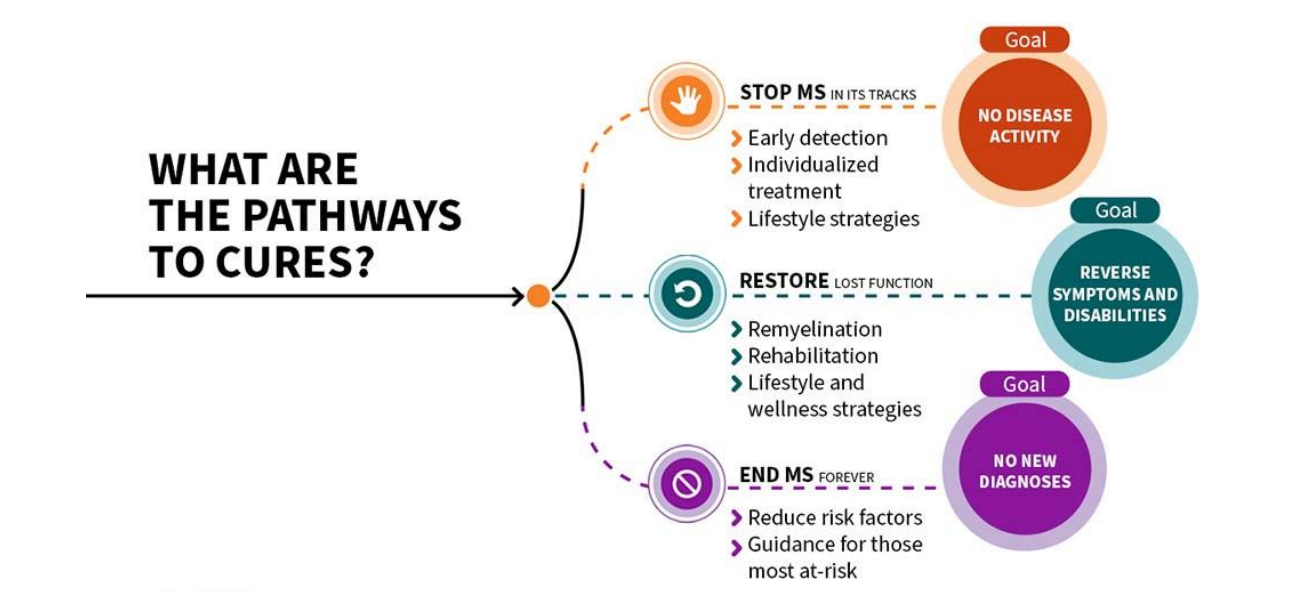

Prepared by: Martin, Diana and Shankar
“Rotarians can make a difference”
The theme for 2020-2023 World MS Day campaign was MS CONNECTIONS. This year in Bangalore, The Rotary International, RAGAMS (The Rotary Action Group Against Multiple Sclerosis) and Bosch partnered with MSSI to celebrate the lives of People with MS, celebrated support networks and advocated for better services for people living with MS.
This year we had an impactful & enlightening session on Government Schemes & Benefits of UDID card by Mr. Umesh, Superintendent – Department of Empowerment for the Disabled & Senior Citizens . More than 100 people attended the program along with leading Neurologist & Rehabilitation Specialists from the city along with Rotary & Bosch representatives. There was also display of Arts submitted by MS persons which added more significance to this event.
The evening also witnessed felicitations of the Chief Guest, Guest speaker, Bosch CSR team, Bosch RBAI Team, RAGAMS, Rotary International & IFRM Music group.
Finally had an enthralling musical program by the IFRM Team along with Dinner.
Link for the photos of the event:
https://drive.google.com/drive/folders/1N3Wep90PHnndBiqSUMb1VWpcBC6LZnA6?usp=sh
Prepared by: Martin, Diana and Shankar
“Rotarians can make a difference”
To help find a cure for MS Rotary Club of Gisborne and RAGAMS is partnering with Australian Rotary Health by providing top up funding for PhD Scholarship recipient Vivian Li to continue her research work at Florey Institute and will be completed 2023. Her project update follows:
Towards developing dendritic cell therapy for multiple sclerosis based on promoting Mertk signalling. Dr Vivien Li
Multiple sclerosis (MS) is a neurological disease resulting from damage to the fatty insulating covering around nerve cells in the brain and spinal cord called ‘myelin’. It occurs when the body’s own immune system, which normally fights infections, starts to attack the myelin, leading to inflammation, cell damage and neurological symptoms.
MS usually begins with a relapsing-remitting phase (RRMS), with flare-ups of symptoms known as ‘relapses’ followed by complete or partial recovery. However, over time, a significant proportion of patients develop secondary progressive MS (SPMS), where there is steady worsening of symptoms and increasing disability without recovery. A smaller number of patients have primary progressive MS (PPMS), where they experience gradual decline from the beginning.
There are now many treatments available for people with RRMS. These reduce the frequency and severity of relapses. However, there has been limited progress so far in finding effective therapies for progressive MS. Many current therapies suppress the immune system broadly, which can increase risks of infection and cancers, and reduce responsiveness to vaccines.
Given these limitations, my research aims to develop a more potent therapeutic approach. Ultimately, the goal would be to take a blood sample from a patient with MS, from which immune cells are isolated in the laboratory and treated with certain signals specific to MS, so that upon re-administration back to the patient, they selectively target and dampen down the disease-causing parts of the immune system responsible for MS.
To achieve this, I have refined techniques to purify the relevant immune cells from blood samples collected from patients with MS. I have defined culture conditions that can modify the behaviour of these immune cells that normally process proteins associated with MS to assume characteristics that are protective/anti-inflammatory rather than disease-inducing/pro-inflammatory. In particular, dexamethasone has been identified as an important factor in altering the behaviour of immune cells. I have used computer assisted techniques to design peptides derived from a recently identified protein that appears to drive MS in a significant subset of people with this disease who carry a particular gene associated with immune system functioning (HLA-DRB1*1501). Amongst a library of peptides that was synthesised, I have identified certain peptides that appear to be preferentially taken up and presented on immune cells to activate the immune system, and this can be modified by dexamethasone.
There is accumulating research that certain genes influence the risks of developing and biological disease processes underlying MS. As such, I have collected blood samples from close to 200 patients with MS treated at the Royal Melbourne Hospital and performed gene testing on these patients to identify those that carry a major risk gene and who may be future candidates for this therapeutic approach.
I have now begun the next steps of adding the disease-inducing peptides to immune cells grown in these anti-inflammatory conditions to determine whether that disease inducing capacity is reversed to a protective influence.
Vivien is needing extra time to finish her thesis, extension funding will be required.
Prepared by: Diana and Martin Taurins
“Rotarians can make a difference” Together, Rotarians, families and friends, are stronger than MS. Our ultimate goal is to bring the world together to improve the quality of life of everybody affected by MS and to end MS forever.
The December quarter of the Rotary year has been very busy for our RAGAMS Team working on items below and the RAGAMS annual report (submitted October1, 2023.)
- We have applied for:
- RAGAMS Real Time Exhibition Booth
- RAGAMS Virtual Exhibition Booth (for paid up Convention Registrants only)
- RAGAMS “Break Out Session”
- RAGAMS (India) is doing a great job, establishing itself and organised several events including a very successful Photo show. Many Indian Rotary Clubs were involved and a Memorandum of Understanding was signed with MS Society of India. Please refer link https://photos.app.goo.gl/eXBXkA6vtHioVbyy9
- RAGAMS (India) is considering how to improve Social media and website www.rotary-ragmsa.org/
- As India is a large country with more than 1.2 billion population we need to expand our reach to other counties and states. We are considering resource required.
Prepared by: Diana and Martin Taurins
Bringing the world together to improve the quality of life of those affected by MS and to end MS forever
“Rotarians can make a difference” Together, Rotarians, families and friends, are stronger than MS. Our ultimate goal is to bring the world together to improve the quality of life of everybody affected by MS and to end MS forever.
The last quarter of the Rotary year has been very busy with MS 50 km walk, Rotary D9800 conference, development for the Houston Virtual Convention Booth, management of the 2022 Houston Convention real time Exhibition Booth and participation in MSIF-MS connections program.
RAGAMS (India) organised a very successful World MS Day event on May 31st with many Indian Rotary Clubs Involved, refer Chairperson Shankar’s email below:
Subject: Re: World MS Day update - MS Connections extended
Greetings from RAGAMS India
Yesterday we had a wonderful program where close to 31 clubs and 3 Rotaract clubs were involved . This was such an impactful event that many clubs have come forward to extend their support to MS and we hope to do some good work going forward. We also had a fashion of persons with MS followed by a fashion show by the 31 Presidents involved. We presented Mementoes to MS Doctors, Rehabilitation Specialists, Persons with MS and Caregivers.
We had an attendance close to 200 people along with press and media. I shall share the media report in a short while. I hope to emulate the same in various cities in the coming months.
Please find attached the photos for your reference.
https://drive.google.com/drive/folders/1AJWNE_EhgldA0_0cox14YP8Cj3FieVgZ
Thank you all for your encouragement and love!
Regards,
Shankar Subramanian
The May 50K fundraisers walked, ran and rode over 500,000 kilometres last month. The May 50K is a virtual event where people around the world run, walk or ride 50 kilometres throughout May to raise money for MS research and improving access to treatment. Despite fundraising in hard times, more than 13,000 participants raised over £1,075,000 across 45 countries.
This year, the global movement came together again to deliver the May 50K with MSIF, MS Australia, Esclerosis Múltiple Argentina, MS Society of Canada, MS Ireland, UK MS Society, and Stichting MS Research in the Netherlands. Money raised through The May 50K supports global, and national MS research, and work to grant access to treatments worldwide.
RAGAMS members and friends in Australia joined up and formed a team in the May MSA 50K event. https://www.themay50k.org/fundraisers/rotaryactiongroupagainstmultiplesclerosis
Special mention to Grant Hocking, Virginia Billson and Renae Gentile lead the way and smashed our original target of $1500 and raised $4133.
Thank you to all the participants who took part this year!
In future, RAGAMS aims to increase promotion of May as MS Awareness month within Rotary International to help boost Rotarian participation in the MSIF events. For more information refer to: http://www.msif.org
Houston Convention Hybrid Event June 4-8:
- RAGAMS Real Time Exhibition Booth: NMMS Society Houston volunteers managed the real time booth from June 4-8, 2022.
Thanks to the team of volunteers in Houston.
- RAGAMS also developed a Virtual Exhibition Booth for paid up Convention Registrants only.
The new Rotary year now begins and we must start updating our strategy, prepare the RI RAG Annual Report by October 1, 2022 and planning for the RI convention to be held in Melbourne May 27-31, 2023 https://convention.rotary.org/en
Special mention to Grant Hocking, Virginia Billson and Renae Gentile lead the way and smashed our original target of $1500 and raised $4133.
Consider resumption of fledgling MS Society Vocational exchange training project.
Reconnect and progress communication with PP Lina Lugheresia, Rotaract Club of Ngong Hills D9212 Kenya and Co-ordinator of Intarconnect.
Identify more country managers and invite to Zoom Meetings.
Prepared by: Diana and Martin Taurins
Bringing the world together to improve the quality of life of those affected by MS and to end MS forever
May is MS Awareness Month in Australia. We have a RAGAMS Team in the May MS 50K walk, Grant Hocking, Virginia Billson and Renae Gentile are leading the way and have surpassed our original target of $1500.
MSIF and 49 of their member organisations promote the World MS Day on May 29th where Global MS organisation participate in a webinar and virtual Choir.
RAGAMS (India) are participating in the MS Day Connections Celebrations on May 29 and are organising an event.
RAGAMS collaborates with and shares a vision with The MS International Federation (MSIF) which is a unique global network of multiple sclerosis organisations, people affected by MS, volunteers and staff from around the world. MSIF is made up of 49 MS organisations with links to many others. MSIF vision is a world without MS. Their mission is to inspire, mobilise and bring the world together to improve the quality of life of everybody affected by MS and to end MS forever.
The Multiple Sclerosis International Federation was established in 1967 as an international body linking the activities of National MS societies around the world including USA, Canada, England, Europe, India, etc For more information refer to: http://www.msif.org Our mission is to promote MS Awareness within Rotary. We can share our lessons learnt and help clubs to start an MS project in their community. We can assist with applications for a Global or District Grant.
RAGAMS is championed from Australia, we require Rotarians in USA, England Europe, India etc. to take a lead role, let us know how you are involved or would like to be involved with the MS Community.
Pre-Covid, at Rotary Conventions many Rotarians advised us that they are supporting MS Chapters in their community. We need Rotarians to promote and share their stories within Rotary project showcase.
Many clubs are still meeting by Zoom. We would love to speak to your club, district, or community group about our Action Group. All you have to do is ask.
We are constantly reviewing our strategic plan to keep abreast with research and latest ways to help people with MS improve their daily quality of life.
For succession planning we need new committee members and new volunteers to the publications team.
We could not work without our volunteers, families and friends.
Over three decades there have been many improvements for people with remitting relapsing MS. There is still no definitive cause or cure for MS. People with Progressive MS have improved physio and improved wheelchairs and electronic management techniques. But MS Investigators need to find a cure and cause. This keeps us all motivated and working for our cause.
There are new projects supporting MS Research awaiting funding and projects the MS Community have been working on for a few years needing more funds.
I hope you can consider RAGAMS as we “Serve to Change Lives”.
Best wishes to you all.
Yours in Rotary,
Rtn. Martin Taurins
Chair - Rotary Action Group Against Multiple Sclerosis
On the occasion of the world MS day, RAGAMS(India) organised a program on the 31st of May, 2022, to bring about awareness about the Multiple Sclerosis disease. This was a joint program with 31 other clubs from RID 3190 in the presence of the District Governor and other district officials. This was conducted by the Rotary Action Group Against Multiple Sclerosis - RAGAMS (India) and MSSI Bangalore Chapter.
They held a fashion show with persons with MS followed by a show with the 31 club Presidents. They presented mementoes to MS Doctors , Rehabilitation Specialists, Persons with MS and caregivers, who have greatly supported in bringing awareness for MS in the community. It was an impactful program in spreading the word on MS and connecting those affected, professionals and policy makers to voice the differences they could make and support each other. The program had an attendance to 200+ people along with press and media.
Prepared by: Diana and Martin Taurins
"Rotarians can make a difference" Together, Rotarians, families and friends, are stronger than MS. Our ultimate goal is to bring the world together to improve the quality of life of everybody affected by MS and to end MS forever.
As last year came to an end, I am sure there are sighs of relief from many people. Throughout the year I have had the privilege attending RAG Leaders meetings via Zoom.
I will circulate information from Rotary action group leaders meeting held January18 re fundraising and finance.
RAGAMS collaborates with and shares a vision with The MS International Federation (MSIF) which is a unique global network of multiple sclerosis organisations, people affected by MS, volunteers and staff from around the world. MSIF is made up of 49 MS organisations with links to many others. MSIF vision is a world without MS. Their mission is to inspire, mobilise and bring the world together to improve the quality of life of everybody affected by MS and to end MS forever.
The Multiple Sclerosis International Federation was established in 1967 as an international body linking the activities of National MS societies around the world including USA, Canada, England, Europe, India, etc.
For more information refer to: http://www.msif.org
Our mission is to promote MS Awareness within Rotary.
We can share our lessons learnt and help clubs to start an MS project in their community. We can assist with applications for a Global or District Grant.
RAGAMS is championed from Australia, we require Rotarians in USA, England Europe, India etc to take a lead role, let us know how you are involved or would like to be involved with the MS Community.
Pre Covid, at Rotary Conventions many Rotarians advised us that they are supporting MS Chapters in their community. We need Rotarians to promote and share their stories within Rotary project showcase.
Many clubs are still meeting by Zoom. We would love to speak to your club, district, or community group about our Action Group. All you have to do is ask.
We are constantly reviewing our strategic plan to keep abreast with research and latest ways to help people with MS improve their daily quality of life.
For Succession planning we need new committee members and new volunteers to the publications team.
We could not work without our volunteers, families and friends.
Over three decades there have been many improvements for people with remitting relapsing MS. There is still no definitive cause or cure for MS. People with Progressive MS have improved physio and improved wheelchairs and electronic management techniques. But MS Investigators need to find a cure and cause. This keeps us all motivated and working for our cause.
There are new projects supporting MS Research awaiting funding and projects the MS Community have been working on for a few years needing more funds.
I hope you can consider RAGAMS as we “Serve to Change Lives”.
Best wishes to you all.
Yours in Rotary
Martin Taurins
Chair - Rotary Action Group against Multiple Sclerosis
Prepared by: Diana and Martin Taurins
"Rotarians can make a difference" Together, Rotarians, families and friends, are stronger than MS. Our ultimate goal is to bring the world together to improve the quality of life of everybody affected by MS and to end MS forever.
A new Rotary year has just begun. A new opportunity to make a difference.
"Serve to change lives" is the Rotary international theme for this year. A great theme for Rotarians who are "People of Action." We know there is so much to do in the world to change the lives of so many people.
Our Action Group is trying to make a difference to those affected by Multiple Sclerosis.
There are so many diseases that need attention affecting many people.
Our wish is to help find a cure for MS. We could help your club to start an MS project and assist with your application for a Global or District Grant.
Many clubs are still meeting by Zoom. We would love to speak to your club, district, or community group about our Action Group. All you have to do is ask.
We are currently working with the Rotary club of Bangalore Rajmahal Vilas KA; India D3190 to develop a project of scale, How to promote and collaborate with the MS
Society in India and MSIF to promote MS Awareness in India.
Best wishes to you all for the New Rotary Year ahead. I know you will "serve to change lives"
Yours in Rotary
Martin Taurins
Chair - Rotary Action Group against Multiple Sclerosis
Prepared by: Diana and Martin Taurins
"Rotarians can make a difference" Together, Rotarians, families and friends, are stronger than MS. Our ultimate goal is to bring the world together to improve the quality of life of everybody affected by MS and to end MS forever.
Hope you all enjoyed the Christmas and New Year festivities, Rotary meetings have started again and we are thinking about tasks for the next 6 months.
MS Australia
International:
Prepared by: Diana and Martin Taurins
"Rotarians can make a difference" Together, Rotarians, families and friends, are stronger than MS. Our ultimate goal is to bring the world together to improve the quality of life of everybody affected by MS and to end MS forever.
Our aim is attract new members to join our team to help us manage RAGAMS, take on a roles such as country managers or officers.
Diana and I and founding MS Awareness Committee have had a challenging year.
After attending The RI Hamburg Convention we booked an Exhibition Booth for Honolulu, but along with other events in Australia all were cancelled due to the COVID epidemic.
The good news is that we have been forced to look at new ways to keep our RAGAMS going.
Firstly our Jacob Taurins Memorial top up PhD Scholarship recipient started work in March 2020.
May 28 President Bernhard Karli Rotary e club of London asked us to present at their Zoom Club meeting. CEO MSIF Peer Baneke and Martin presented, Please view by clicking on the following Link: zoom_028th May2020 speaker meeting on MS (3).mp4
In July Rtn Raghu Allam D3190 Action Groups Chair and Shankar Subramanian member of Rotary Club of Bangalore Rajmahal Vilas D3190 contacted us wanting to create an MS Action Group in India. RAGAMS (India) was successfully launched via Zoom with over 100 participants participating. Please view by clicking following Link: https://www.youtube.com/watch?v=JsOTsMeXDLk&feature=youtu.be
In October PP Lina Lugheresia, Rotaract Club of Ngong Hills D9212 Kenya and Co-ordinator Intarconnect invited RAGAMS to a Zoom Interview to promote Rotary Alumni to reconnect with Action Groups as part of Rotary Reconnect Week. Please view by clicking on following link: https://www.facebook.com/2023768591248320/posts/2527447860880388/
We want Rotary clubs to partner with RAGAMS and MSIF http://www.msif.org
We need to reconnect with lifetime members and people with empathy for people with MS and to take on an active role in RAGAMS.
Martin Taurins
News 2020
10xmembers from India have joined our group and we now have a Country Manager for India.
Due to COVID epidemic Honolulu Convention was cancelled.
We participated in the RI Virtual Convention and had a RAGAMS Exhibition Booth
We presented RAGAMS at a zoom meeting with eClub of London
News September 2019
Contacting visitors met at Hamburg RAGAMS booth to encourage partnering with international MS projects.
Jacob Taurins Memorial PHD Scholarship Candidate in partnership with Australian Health, Melbourne University and Florey institute selected will start February 2019.
Rotary Club of Bendigo D9800 ran the 2019 24hr Megaswim and raised $32,000 for MSA.
RAGAMS investigating and setting up communication with Rotary clubs in France fund the MSIF Du Pre Scholarship.
Working on implementing RAGAMS new strategy, updating website and presenting at Rotary Clubs in D9800.
Setting up communication International communication channels MSIF and MSRA and RAGAMS members so we can act as resource for Rotary clubs to implement MS Projects.
RAGAMS has attended convention since Melbourne FYI RI Conventions Listing.
Below is a list of past projects undertaken by RAGAMS and other clubs / districts. These will be promoted on the new website along with stories of how these projects were organised as a way of activating clubs and districts to take action.
Minutes of the RAGAMS Meeting, July 14 2014
RAGAMS - Annual Report To Rotary International 2013
RAGAMS Newsletter July 30 2013
Minutes of the RAGAMS Meeting February 25th, 2013
2014 June 01- 05 Martin, Diana, Jacob and his carer Maria went to Sydney, Australia. In July 2014, Martin was awarded a Double Sapphire Paul Harris Fellow and Diana a Sapphire Paul Harris Fellow.
2013 June. Martin and Diana went to International Convention in Lisbon, Portugal. Bronwyn Martin from the Rotary Club of Philadelphia, USA attended the International Assembly in San Diego, USA
2012 June . Martin and Diana went to International Convention in Bangkok, Thailand
2011 May 22-25 Diana and Martin went to International Convention in New Orleans, USA
2010 June 20- 23 Diana and Martin went to International Convention in Montreal, Canada
2009 June 21-24 Martin and Diana went to international Convention in Birmingham, UK
2008 JUNE 22 -25 Martin and Diana went to International Convention in Los Angeles, USA
2007. JUNE 17-20 Martin went to International Convention in Salt Lake City, UTAH, USA. Diana was awarded a Paul Harris Fellow
MS Meeting Minute July14-2014 2006. JUNE 11-14 Martin went to International Convention in Malmo, Sweden and Copenhagen, Denmark. 2006. Jacob Martin Taurins received the Royce Abbey Award on 2006.